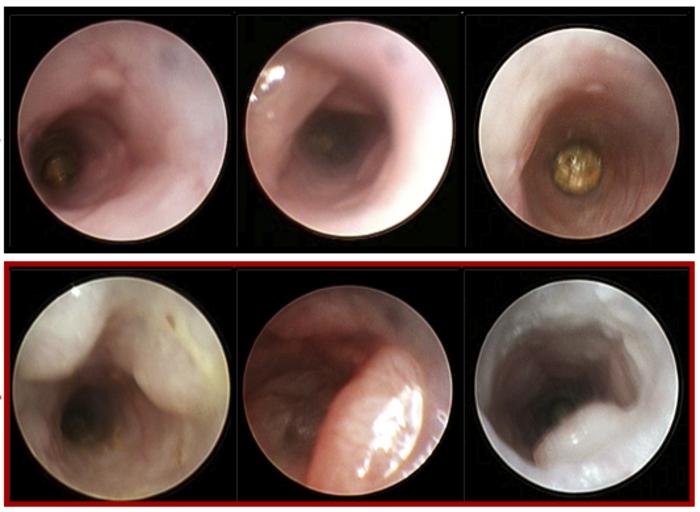Blood
Mutations in blood stem cells can exacerbate colon cancer
image: Compared with normal mice (top), colonoscopies detect more, and larger, tumors in the intestines of mice with clonal hematopoiesis (bottom).
view more
Credit: © 2023 Feng et al. Originally published in Journal of Experimental Medicine. https://doi.org/10.1084/jem.20230011
Researchers at the University of Florida College of Medicine have discovered how common age-related changes in the blood system can make certain colon cancers grow faster. The study, to be published August 24 in the Journal of Experimental Medicine (JEM), also suggests how these effects might be therapeutically targeted to reduce tumor growth and improve patient survival.
As we age, the hematopoietic stem cells that reside in the bone marrow and give rise to all of the body’s different blood cells gradually acquire mutations in their DNA. Most of these mutations have no effect, but some can enhance a particular stem cell’s ability to survive and proliferate, resulting in large numbers of blood cells that carry the same mutation. This phenomenon, known as clonal hematopoiesis, is seen in 10–20% of elderly people and is associated with an increased risk of developing blood cancers. But clonal hematopoiesis is even more frequently seen in patients with many other types of cancer outside of the blood system and is associated with faster tumor progression and shorter survival times.
“However, whether the presence of clonal hematopoiesis causes the aggressive phenotype of unrelated solid tumors has not been vigorously addressed,” says Olga A. Guryanova, now an associate professor at the University of Florida College of Medicine and a member of the University of Florida Health Cancer Center, who led the new JEM study.
Guryanova and colleagues decided to investigate the role of clonal hematopoiesis in colitis-associated colon cancer (CAC). Inflammatory bowel disease, including ulcerative colitis and Crohn’s disease, is a well-known risk factor for colon cancer, and clonal hematopoiesis is prevalent in both IBD and colon cancer patients.
The researchers generated mice with clonal hematopoiesis by transplanting them with blood stem cells lacking one copy of Dnmt3a, the most frequently mutated gene in clonal hematopoiesis patients. The mice were then treated with drugs that induce the development of CAC. Guryanova’s team found that CAC occurred more frequently, and developed more rapidly, in mice with clonal hematopoiesis, resulting in larger tumors with a worse histopathology.
Guryanova and colleagues determined that one way clonal hematopoiesis promotes the development of CAC is by increasing the number of blood vessels that supply the intestinal tumors with the nutrients and oxygen they need to grow. Blocking the formation of these extra blood vessels with axitinib, a drug approved by the FDA to treat advanced kidney cancer, inhibited the growth of CAC tumors in mice with clonal hematopoiesis. In contrast, axitinib had little effect on the growth of CAC tumors in mice without clonal hematopoiesis.
“Our results show that alterations in Dnmt3a in bone marrow stem cells can have profound impact on the development of CAC through multiple mechanisms, some of which may be therapeutically targetable,” Guryanova says. “Our findings, for the first time, solidify the causal relationship between clonal hematopoiesis and the severity of solid tumors and identify potential therapeutic strategies.”
Feng et al. 2023. J. Exp. Med. https://rupress.org/jem/article-lookup/doi/10.1084/jem.20230011?PR
The study was funded in part by the National Cancer Institute and the UF Health Cancer Center, which receives crucial support for its cancer research from the state of Florida through the Casey DeSantis Cancer Research Act (Fla. Stat. § 381.915).
# # #
About Journal of Experimental Medicine
Journal of Experimental Medicine (JEM) publishes peer-reviewed research on immunology, cancer biology, stem cell biology, microbial pathogenesis, vascular biology, and neurobiology. All editorial decisions on research manuscripts are made through collaborative consultation between professional scientific editors and the academic editorial board. Established in 1896, JEM is published by Rockefeller University Press, a department of The Rockefeller University in New York. For more information, visit jem.org.
Visit our Newsroom, and sign up for a weekly preview of articles to be published. Embargoed media alerts are for journalists only.
Follow JEM on Twitter at @JExpMed and @RockUPress.
Journal
Journal of Experimental Medicine
Method of Research
Experimental study
Subject of Research
Animals
Article Title
Hematopoietic-specific heterozygous loss of Dnmt3a exacerbates colitis-associated colon cancer
Article Publication Date
24-Aug-2023
COI Statement
R.L. Levine reported personal fees from Qiagen, Ajax, Zentalis, C4, and Jubilant and grants from Abbvie and Calico outside the submitted work. He has received honoraria from Astra Zeneca and Kura for invited lectures and from Gilead for grant reviews. R. Yaeger reported grants from Mirati Therapeutics, Pfizer, Boehringer Ingelheim, and Daiichi Sankyo and personal fees from Mirati Therapeutics and Zai Lab outside the submitted work. No other disclosures were reported.
Disclaimer: AAAS and EurekAlert! are not responsible for the accuracy of news releases posted to EurekAlert! by contributing institutions or for the use of any information through the EurekAlert system.

